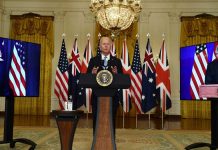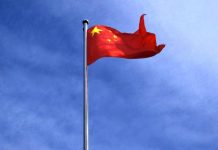The United States and the Philippines are preparing to resume defense projects, after Manila agreed to keep a military agreement that President Rodrigo Duterte had threatened to scrap.
The move enables the two sides to strengthen their longstanding alliance in the region, in light of a dispute with Beijing over the South China Sea, according to Bloomberg.
Philippine Defense Secretary Delfin Lorenzana met his US counterpart Lloyd Austin in Washington on Friday, and they affirmed their commitment to continue strengthening relations between the two countries.
Duterte had agreed last July to maintain the Visiting Forces Agreement, signed two decades ago, which sets the rules for rotating thousands of American soldiers, inside and outside the Philippines, in military exercises and maneuvers.
And a statement issued by Manila stated that “the two sides agreed to work on a bilateral maritime framework that enhances cooperation in the maritime field, and to resume projects at sites approved by the (Enhanced Defense Cooperation Agreement) in the Philippines.”
The agreement concluded in 2014, allows for a greater American presence in the Philippine military bases, and the construction of new facilities there, according to Bloomberg.
The two defense ministers discussed developments in the South China Sea, through which goods worth more than $3 trillion pass annually, and Beijing claims sovereignty over the majority of it, while Malaysia, Vietnam, the Philippines, Brunei and Taiwan claim parts of it.
Austin reiterated the United States’ commitments under the “Mutual Defense Treaty” concluded seven decades ago, and the two sides pledged to “maintain an armored alliance.”
Chinese allegations “unfounded”
Austin toured Southeast Asia, including Singapore, Vietnam and the Philippines, last July, considering Beijing’s claims to sovereignty over the South China Sea “unfounded and unhelpful,” according to Bloomberg.
“We will not wince when our interests are threatened, but we do not seek confrontation,” he said in Singapore. “I am committed to pursuing a constructive and stable relationship with China, including stronger communications during crises with the Chinese military.”
He stressed that the Indo-Pacific region is a “priority theater of operations” for the United States, noting that he will continue to defend the cause of a “more just, open and inclusive regional order.”
“We don’t think any country should be able to dictate the rules, or worse, without an agreement,” he added.
Austin delivered a speech before the International Institute for Strategic Studies in Singapore, focusing on how the United States “is strengthening one of our strategic assets in the region, our powerful network of allies and partners.”
Visiting Forces Agreement
The US minister’s visit came about two weeks after the Philippines, for the third time, suspended a decision to cancel the Visiting Forces Agreement.
The Philippines’ foreign minister, Teodoro Locsin, said the freeze would continue for another six months, while Duterte and Washington “address his concerns about certain aspects of the agreement.”
Duterte told the United States last year that he was scrapping the deal in response to its refusal to grant a visa to an ally senator, and the deal would have expired in August had the president not extended it for a third time.
The move coincided with the escalation of tension between Manila and Beijing over the South China Sea, as the Philippines protested several times against the presence of hundreds of Chinese “naval militias” inside its economic zone, in a move it considered “illegal” and “threat” to it.
Relations between the United States and its former colony witnessed complications after Duterte came to power in 2016, his repeated condemnation of Washington’s foreign policy, and his closeness to China.
And Reuters news agency quoted the Philippine ambassador to Washington, Jose Manuel Romualdez, as saying that the “visiting forces agreement” was amended, to make it “acceptable” and “beneficial” for the two countries.
Manila has previously resented files such as the lack of jurisdiction over US soldiers found guilty of crimes in the Philippines, and damage to the environment during US naval exercises.





